- Home
- Fay Weldon
Down Among the Women Page 13
Down Among the Women Read online
Page 13
Scarlet’s spring seems a long time coming. No sun rises to bathe her world with warmth.
She is deserted by, has deserted, Wanda, Kim, family, friends.
She makes no new acquaintances here in Lee Green. They think she is snobbish, and they are right. Only Byzantia smiles and grows and talks, beginning to feed back to her mother the nourishment she has sapped for so long.
Suez. English, French, Israeli troops—shooting at Egyptians? It seems, in those naïve days, incredible, monstrous, dangerous, unfair.
Scarlet is frightened. She thinks the nuclear holocaust is imminent. She wants to take Byzantia and flee to Cornwall, where she imagines she will be safe. Edwin won’t give her the fare money. Edwin is shocked.
‘You are mad,’ he says. ‘If there is any danger, which there isn’t, it is your duty to stay here.’
‘Why?’ she asks.
‘You can’t run away,’ he says, indignant.
‘But I want to,’ she says.
Suez passes, nations subside; but the fact that Scarlet wants to run away, once spoken, stays in her mind. It feeds, grows, nourishes the roots of her being. Is spring coming?
A stall-holder at the Saturday market where Scarlet shops, a dealer in fabrics, forty, a short, fat, lively villain, propositions her as she buys elastic for Byzantia’s knickers. Scarlet is shocked; she laughs it off. He renews his request the following week. She refuses. But she quite likes him. He is insistent.
‘Why me?’ she asks.
‘You’re my type,’ he replies.
‘A fat, spotty, dreary housewife?’ asks Scarlet—and indeed she is all these things, and looks a good thirty-five as well—‘Your type?’
‘You’re posh,’ he says. ‘I’ve got a little room round the corner—’
‘I’m not like that,’ she says. ‘I’m a married woman.’
‘What do you want? Money?’
‘No,’ she says, shocked.
‘I’ll tell you what,’ he says. ‘Nylons.’
She looks down at her stockings, as he does. Stockings are always a problem to Scarlet. When Edwin goes through the accounts, he questions the amount she spends on nylons, and reproaches her for not taking more care of them. She goes round, always, with laddered stockings.
‘All right,’ she says.
Spring is coming.
They rendezvous one evening, the barrow boy and Scarlet. She has told Edwin that she is going to the pictures: she has checked the stills outside the cinema during the day to make her story stick in case she is questioned later. The film is The Nun’s Story. She likes that. Deceit comes easily to her.
Alone with this stranger in a neat clean chintzy bed-sitting room in a private house, she talks nervously about his wife, which disconcerts him.
‘We didn’t come here to talk,’ he says. ‘Take your clothes off.’
She does.
Two pairs of cut-price nylons the richer, Scarlet walks the Lee Green streets, until it is time for the cinema to end. Then she joins the crowd as it leaves and walks home.
Scarlet feels she is at last a whore. She need no longer resist Edwin’s accusations. She can accept them gracefully and have some peace.
The next Saturday Scarlet goes to the market seeking her client, who, apparently pleased with her performance, has asked her thus to meet him. His stall is empty. Where once the gauzy laces and the brilliant trimmings dangled, is now just a bare dusty platform. He has gone. Gone to another market, another part of London, to buy another posh lost lady housewife for two pairs of cut-price nylon stockings.
Scarlet walks home with Byzantia holding her hand. Scarlet cries. Scarlet sings ‘Tammy’s in love’ to Byzantia. It is a commercial love-song. It was playing on the radio—he had turned the volume up so that his landlady, of whom he seemed nervous, would not know he had a visitor—while he obtained his nylons’ worth from Scarlet.
Scarlet loves her client. Scarlet will love anything, anyone, so long as it’s impossible and not actually Edwin, whom she married for what he could give her and now finds that this is nothing.
Poor Edwin. To grace him with her presence in his house, eating his food, spending his money, though wearing her own nylons, is hardly enough.
Scarlet cries herself to sleep for a full week. Tears water the ground. All is ready for the sun.
It doesn’t dawn.
But one day there is a knock at the door. The milkman? Scarlet shuffles down, wearing Edwin’s slippers. It is Susan.
Susan has driven to visit her in her little Morris Minor. Simeon sits in the back, a neat, clean little boy, even neater and cleaner than his mother or his grandmother before him.
Scarlet asks them in. Scarlet looks round her house with their eyes. It is a dim and dusty place. Edwin will have nothing in it changed. When she Hoovers the carpets she must put the furniture back exactly where it was before. The legs of the three-piece suite (1932) have worn twelve small neat holes through the carpet in the living-room.
Byzantia trips Simeon up. She is not used to other children in the house. Edwin does not encourage them.
‘This is our house,’ he will say. ‘Not a stage-post for strangers. You, me, Byzantia—shall we call her Edna?—we are happy just by ourselves.’
Simeon, tripped, does not cry. It is not man-like.
Susan cries.
‘It’s all my fault,’ she says, ‘I’ve felt so bad about it, Scarlet.’
‘Bad about what? I’m all right.’
‘You’re not all right,’ says Susan. ‘You’re fat and miserable and you live in this horrible place with that horrible man.’
‘How do you know he’s horrible?’
‘Wanda says so.’
‘You talk to each other, then?’
‘Yes, actually.’
Susan has had a nervous breakdown. She trembled and cried, and could not stop. Kim took her to a psychiatrist; she still visits him weekly; now she visits Wanda and talks to her instead of to her mother. She feels better these days. She dreams about Scarlet, and feels she must make amends, somehow.
‘It was me would never let Kim send you money,’ says Susan, in an agony of remorse. ‘It was me made him so nasty to you. I was angry about Byzantia.’
Scarlet is baffled. Susan explains she is seeing a psychiatrist and Scarlet assumes that Susan is a little out of her mind.
‘You’ve got to get out of here,’ says Susan.
‘Why?’
‘It upsets me too much,’ complains Susan.
Susan cannot escape, these days, in the manner she used to. Just before her breakdown, when she fell asleep it was as if her eyes stayed open. The night worlds would be closed to her. She would sleep, that was all. And waking in the mornings in her new house—for Kim has grown rich and they have moved to Kew—she would think she was still back in Baker Street and would stumble round the bedroom trying to find her bearings. Now at least she knows where she wakes, and she dreams of Scarlet, and has steeled herself to come visiting.
Edwin returns, and is introduced to Susan. Susan leaves as quickly as possible, but not before Edwin has reminded her that her husband owes him £7. 10s. 0d.
‘It is not the money,’ he says. ‘It is the principle. A father must take responsibility for his daughter, whatever the daughter may be like. I am sure I will take responsibility for Marjorie—’
‘Marjorie?’ asks Susan, confused.
‘My name for Byzantia—although she is not even mine by blood. I take it Scarlet is Kim’s daughter, although knowing Wanda’s habits one can forgive him for perhaps doubting it? Was that why he failed to pay me the £7. 10s. 0d? I have sometimes thought so.’
Susan writes a cheque. Scarlet is humiliated.
It takes Scarlet a week to move such belongings as she has out of the house, suitcase by secret suitcase, to an astonished Lee Green neighbour. Then she steals seven pounds from Edwin’s wallet in the middle of one night, wakes Byzantia early in the morning, and they leave together.
She m
eans never to return.
9 ON THE MOVE
DOWN AMONG THE WOMEN. If all else fails, we can always be useful.
Angling story:
Two men sit fishing on a river bank, raincoated, morose, silent. Eventually one speaks.
1st angler: You weren’t here yesterday, then.
2nd angler: No.
1st angler: (presently) Something hold you up, then?
2nd angler: Got married.
Silence.
1st angler: Good-looker, is she?
2nd angler: No.
Silence.
1st angler: Got money, has she?
2nd angler: No.
Silence.
1st angler: Sexy, then?
2nd angler: You’re joking.
Silence.
1st angler: Good little housekeeper, is that it?
2nd angler: No. She’s blind.
Silence.
1st angler: Then what you want to go and marry her for?
2nd angler: She’s got worms.
The girls are on the move. That same manoeuvring star, which once led them trooping up the stairs to offer help to Scarlet, which then dispersed, antagonized and rooted them down for years—like children playing Statues, caught when the music stopped—that same star now takes another turn and sets these young women in motion once again.
Helen turns up at Jocelyn’s house in the middle of the night. (It is fortunate that Philip is away on business.) Jocelyn lives in Chelsea now. She is a cool, chic, childless young lady. She has a built-in kitchen, new American style. Her cushions are covered in Thai silk, and tastefully arranged in a cool, chic, childless drawing-room. Her bathroom is pink and orange, and the soap and towels match. Her drinks tray contains bottles of every imaginable form of alcohol. Her accent has sharpened into Upper English Chelsea. Shopgirls pay attention when Jocelyn walks in: it seems an achievement.
To live so graciously costs a great deal—more, probably, than Philip can afford on his salary. They do not, of course, discuss money, or sex, or politics. Jocelyn, made nervous by the amount of her Harrods’ bill, has been obliged to spend some of her capital. One suicidal impulse, as it were, leading to another, she then takes the rest out of Gilt Edged and re-invests in Insurance Companies. She does not tell Philip.
The parrot has died. Jocelyn left the window open one frosty night, and forgot to move the cage, so that it caught a chill, wilted, and expired, reproaching her. Now she has a highly-bred dachshund with a bronchitic cough, and a limp, creased body.
Jocelyn, opening the door to Helen, wears a pretty white and blue fur-edged housecoat and white fur slippers. (Central heating is not yet fashionable. Hot bedrooms seem sinful and over-luxurious.) As for Helen, she has walked half-way across London in her night-gown, and the night is not warm, and her face is battered, but still she smiles with condescending grace at poor, dull, chic, bourgeois Jocelyn.
‘You can’t have come dressed like that,’ is the first thing Jocelyn says.
‘I walked boldly,’ says Helen, ‘with my head held high. I assumed I was wearing evening dress, so others assumed it too. No one remarked on anything unusual.’
‘Not even a policeman?’ asks Jocelyn, leading her friend to the bathroom.
‘One can tell you’re a rate-payer,’ says Helen. She surveys the cleanly lustres of the bathroom, and manages to make clear that it is not to her taste. Jocelyn bathes Helen’s eye with cotton wool. (We are not yet into the era of plentiful tissues, and the toilet paper is still hard and shiny, made by puritanical Northerners.)
Helen’s face is quite badly battered. Jocelyn is nervous, and her hands tremble, but Helen stands still and docile, as if accustomed to being tended.
‘What happened?’ asks Jocelyn. ‘Was it an accident?’
‘No,’ says Helen. ‘You are the one who has accidents, not me. It is a private matter actually.’
And she peers at her face, and the swollen purplish flesh around her eyes.
‘It gives one a slightly oriental look,’ she says. ‘It might please decadent tastes. What a pity Philip isn’t here.’
This remark puzzles Jocelyn. A lot of things about Helen puzzle Jocelyn. Jocelyn is not stupid. Let us say she is going through a stupid patch, as people will when they are attempting to evade unpleasant truths; and Jocelyn, these days, maintains that she is happy.
Helen thinks Jocelyn is a pain in the neck, but has, frankly, nowhere else to go.
Jocelyn, for her part, welcomes Helen kindly, even though it is the middle of the night, both for old times’ sake, because X is by now one of the country’s leading painters, and artists of all kinds have a cachet down here in Chelsea, and because she has not the courage to turn Helen away. Helen makes such vibrant demands of the world, it seems to Jocelyn, that other people’s wills and wants tend to dissolve in her path. Only X faces her, implacable, and refuses to be manipulated.
Helen and X have quarrelled. Or rather, Helen and X have been discovered by Y, and X, it transpires, can live without Helen but not without his wife.
Picture the scene in which Y, paler than ever, and trembling, arrives at the studio and stands at the end of the bed in which Helen lies surprised, helpless, and even righteous—for on that particular night X has worked late and fallen into bed too tired to even put his arms round her. Helen stares, and then smiles politely. Y takes off a shoe and starts to beat Helen about the head and face.
X wakes, slips out of bed, goes into the bathroom and locks the door. Y abandons her victim and batters the door with her shoe.
‘Coward,’ she cries, ‘come out of there.’
There is silence.
‘I want you to come out of here,’ she shrieks.
‘Momma don’t allow no female-fucking here,’ he sings, in his powerful voice, ‘Going to fuck that female any old how, cos momma don’t allow no females here—’
Thwarted, Y takes up a kitchen knife and goes round the room slitting canvases. Helen emerges from under the bedclothes, and struggles long and silently with Y to take the knife away.
X emerges from the bathroom.
‘What are you doing here?’ he asks his wife. ‘You promised me you would never come. What kind of person are you, to break a promise like that? How can I trust you again? And what are you doing up in the middle of the night? Shouldn’t you be asleep? I hope you haven’t left the children alone?’
Y squirms free of Helen and advances on X with her knife raised. Helen rushes into the bathroom and locks the door.
X disarms Y, easily.
‘How can you!’ says Y, inadequately enough. ‘And with Helen!’
‘But you know I have girls here,’ says X. ‘You have never minded before. I’m sure you have your own diversions.’
‘But I haven’t,’ says Y.
‘Is that the trouble then?’ asks X. ‘Shall I arrange something for you?’
He is very angry at his wife’s intrusion. He does not like his actions questioned, or his liberty challenged.
‘It’s not like that,’ says Y, helpless, and already beginning to feel she is in the wrong. ‘I only want you.’
‘That is your misfortune,’ he says. ‘Do not burden me with it.’
‘But Helen!’ she says. ‘I had no idea it was Helen. You’ve both been cheating me.’
‘You are mad,’ he says. ‘First, you practically drive me away from home and push me into bed with other women. If you remember it, it was your idea I should have this place. I didn’t want it, God knows—I was happy at home. Now you object when I use it. What proper wife behaves the way you do?’
‘I love you,’ says Y. ‘I want you to be happy.’
‘Love?’ he says. ‘What’s that? You wanted me out of the way so you could pursue your career, that’s all.’
Y gets her knife back and starts slitting more of Helen’s paintings, and breaking Helen’s best glasses and china.
‘Stop her, stop her,’ bleats Helen through the keyhole, but X makes no move.
‘Stop, stop! Let me talk to you, let me explain,’ begs Helen, but all Y does is slit on, and smash on, and say, ‘What a lousy painter she is! What crude and amateur stuff. An amateur artist and an amateur whore. What an insult she is, what a parasite, what a nothing.’ And X just sits and watches. He seems amused, now, as if he was watching the antics of a performing animal.
‘I am going to hand back the lease,’ says Y, pale and vicious. ‘Tomorrow. You have cheated me long enough. Why should I pay for your filthy pleasures?’
‘Don’t do anything so rash,’ says X, moved to nervousness at last. ‘I have an exhibition next month. I can’t move out now, not without spoiling everything.’
‘It’s you who’ve done the spoiling,’ says Y. ‘If you see anything good or noble, you can’t wait till you have spoiled it. Why should I put up with it? This is my place. I command you to leave now, or I will call the police.’
‘Helen will leave, if it all upsets you so much,’ says X. ‘I never meant to upset you. I honestly thought you didn’t care.’
At this Helen opens the bathroom door, looks at X with no little contempt, and walks out of the studio and into the street.
Thus Helen makes her exit, and once out in the street wonders where to go. Scarlet is lost in limbo, Sylvia weeping in Dulwich, Audrey plucking feathers in Suffolk. Only Jocelyn lives sensibly in central London.
‘So he’s finished with you, has he?’ says Jocelyn not without relish, pouring Helen brandy.
‘Of course he hasn’t,’ says Helen, who is wrapped in a blanket. ‘He is only trying to keep his wife quiet. What a spoilt and dangerous woman she is! How terrible it is that the wrong people always have the money, the power and the glory.’
‘She earned the money,’ says Jocelyn. ‘And it must have nearly all gone by now.’
‘She didn’t earn it,’ says Helen. ‘She won it. And I daresay she slept with the judges in order to do so. I wouldn’t put it past her. She is a vile, scheming, neurotic woman. How desperate she must be to have recognition. She is a remarkably inept painter.’
‘I thought she was supposed to be rather good,’ murmurs Jocelyn.
‘I hardly imagine,’ says Helen, looking round the paintings on Jocelyn’s walls, ‘that you are an expert. And now if you don’t mind I will go to bed. My face is beginning to hurt.’

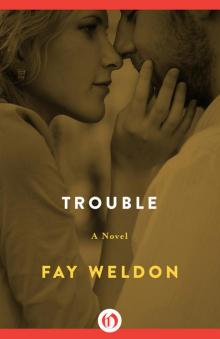 Trouble
Trouble The Heart of the Country
The Heart of the Country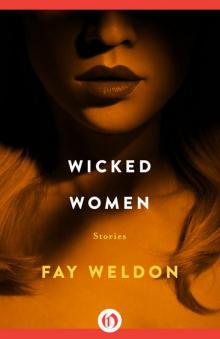 Wicked Women
Wicked Women Mischief
Mischief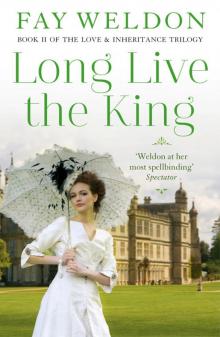 Long Live the King
Long Live the King Remember Me
Remember Me Worst Fears
Worst Fears Chalcot Crescent
Chalcot Crescent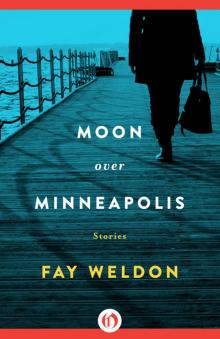 Moon Over Minneapolis
Moon Over Minneapolis The New Countess
The New Countess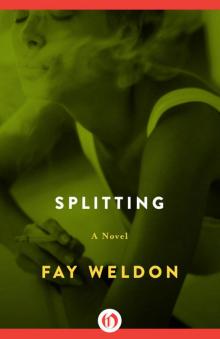 Splitting
Splitting After the Peace
After the Peace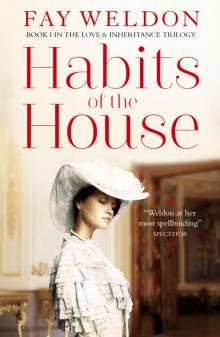 Habits of the House
Habits of the House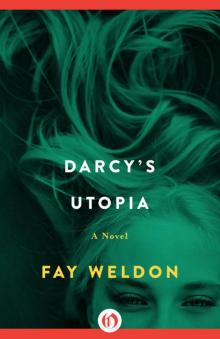 Darcy's Utopia
Darcy's Utopia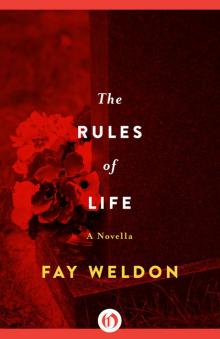 The Rules of Life
The Rules of Life Kehua!
Kehua! Before the War
Before the War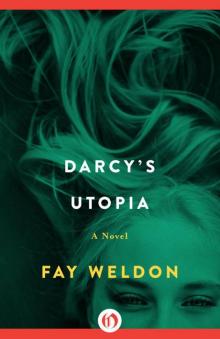 Darcy's Utopia: A Novel
Darcy's Utopia: A Novel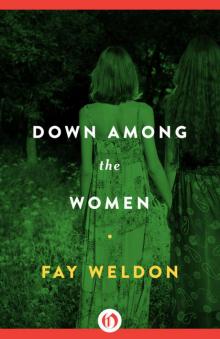 Down Among the Women
Down Among the Women Letters to Alice
Letters to Alice 3 Great Historical Novels
3 Great Historical Novels Female Friends
Female Friends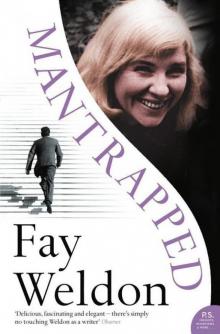 Mantrapped
Mantrapped The Bulgari Connection
The Bulgari Connection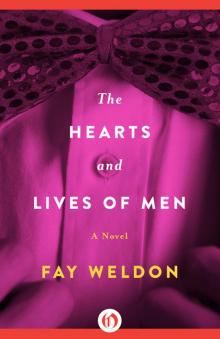 The Hearts and Lives of Men
The Hearts and Lives of Men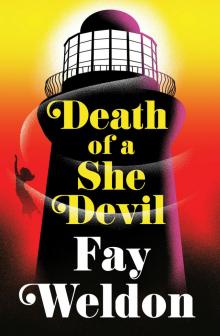 Death of a She Devil
Death of a She Devil